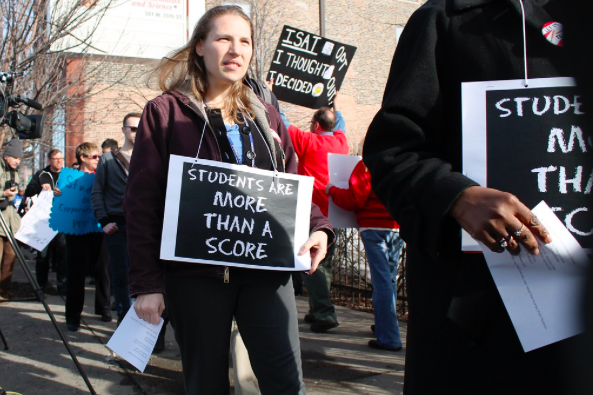Centuries ago William Shakspeaer once remarked, “To test or not to test that is the question,” and ever since we as a society have been trying to answer the bard’s query. With moral, educational, and social nuance the question of whether the SAT/ACT is an accurate measure of a student’s ability has become increasingly complex, all coming to a crescendo with the devastating strike of Covid-19. After the Covid-19 pandemic, a large majority of universities in the U.S became test optional. However, as society inches forward toward normalcy, universities are faced with a question: Do they return to requiring standardized test scores?
In terms of being an accurate predictor of college success, a variety of studies have shown that standardized tests have achieved this goal. In 2019 The College Board published a large-scale study to test the SAT’s validity, and found that students with higher SAT scores were more likely to have higher grades in college. Moreover, earlier this year a study done by the Opportunity Insight Out of Harvard found that students who applied test optional at “Ivy Plus” universities and were admitted, had a mean GPA similar to students who achieved a mean 1307 SAT score, which is below the 25th percentile for these highly prestigious universities. However, with that being said there has also been plenty of studies and anecdotal evidence to show that the SAT and ACT are not the end all be all. In 2014 William Hiss, the former Dean of Admissions at Bates College, conducted a study using a larger sample size, looking at three dozen test optional schools around the country ranging from small liberal arts intuitions to large state universities. Hiss not only found that GPA was a better indicator of a student’s abilities, but also that their was virtually no difference in grades and graduation rates between test “submitters” and “nonsubmitters.” While the college landscape certainly has changed in the 10 years between Hiss’ study and now, one factor remains constant: there are plenty of students who proved that a standardized test score does not accurately measure all of their capabilities. As Hiss said 10 years ago, “Human intelligence is so multifaceted, so complex, so varied, that no standardized testing system can be expected to capture it.” When asked about whether a SAT/ACT score measures college success Friends Academy College Advisor Cullen Player stated, “On one hand a good test score could be a predictor of success in college. On the other hand, a not good test score, whatever that means, often doesn’t reflect a student who won’t succeed in college. So I don’t think it works both ways, and I think that’s what many colleges are recognizing and why they are remaining test optional”.
When looking beyond the numbers, the dichotomy of standardized testing is further exhibited in how it simultaneously levels the playing field and favors those with socioeconomic privilege. Friends Academy English Chair Brad Wetherell recognized this tension when he asserted that “Students that have access to tutors, who study the test and how to take the test, have a great advantage over students who don’t have access to those resources. On the flip side, there’s a way in which standardized testing is an equalizer for underprivileged students who go to schools that don’t distinguish them, but if they have natural or hard won gifts, they can stand out via standardized tests”. Moreover, the fixed nature of standardized tests acts as an equalizer as it provides a uniform baseline for students to be judged. Friends Academy Student Max Katovitz argued that this aspect of standardized testing made it a more effective measurement then a GPA as “you need something standard to judge people in different environments as there is a lot of grade inflation from school to school, and people in different schools are going to be taught different things, so a standardized metric is needed and the SAT or ACT or AP’s are what we have to do that right now”.
Whether you love them or loathe them, it seems that standardized tests such as the ACT and SAT are here to stay. These exams provide hope for some students and anxiety for others, but until a better measure of students’ college readiness and potential success is uncovered, standardized tests will be utilized in the college admissions process.
Work Cited
https://www.manhattanreview.com/sat-predictor-college-success/








